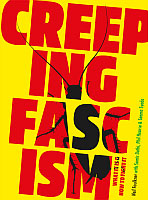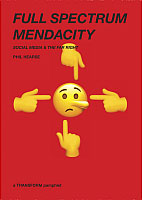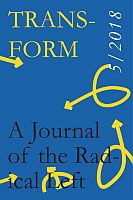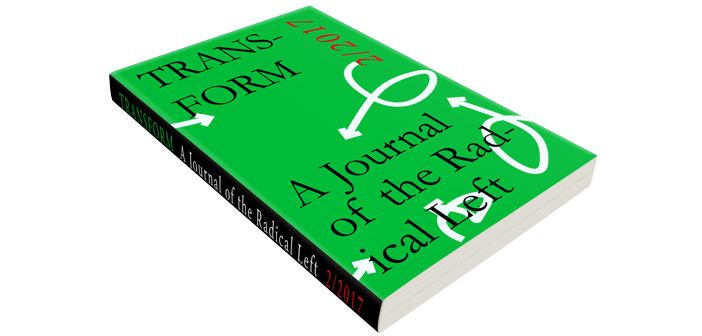PUBLICATIONS
]]>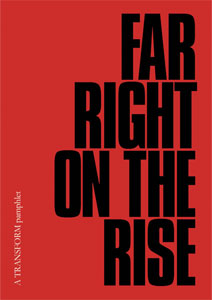 These are dangerous times. We are facing the biggest upsurge of the far right since the 1930s. Everywhere they are using racism and hostility to migrants to build support and spread hate and fear.
These are dangerous times. We are facing the biggest upsurge of the far right since the 1930s. Everywhere they are using racism and hostility to migrants to build support and spread hate and fear.
What is the far right and how do we organise to defeat it?
Contents:
The rise of the far right Andrew Burgin
How do we fight the new right-wing popular movements? Sue Sparks |
Islamophobia and the new fascist movement Phil Hearse
Creeping Fascism: what it is, and how we fight it Neil Faulkner
This is a TRANSFORM pamphlet. TRANSFORM is linked to the European Left Party and published by Public Reading Rooms.
]]>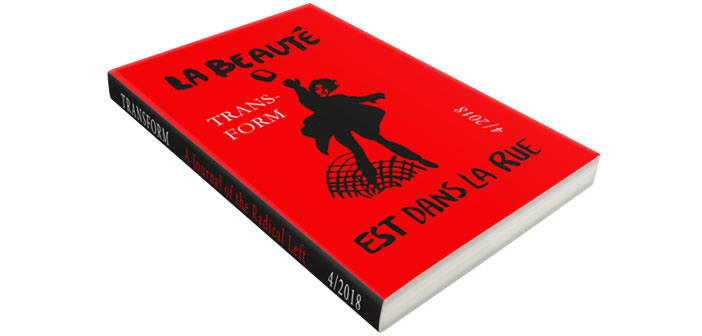
Issue #4 of Transform is a special issue to mark the 50th anniversary of the dramatic events of 1968: the Vietnamese Tet offensive, the Prague Spring, the uprising of the black communities in the US, the revolutionary wave on the streets of Paris in May, all seemed to herald a new generalised advance towards socialism.
These events galvanised a generation into political activity. But the hopes raised in this new left by les événements of 1968 were largely unfulfilled, underestimating the power of resistance of the capitalist class. Experience and the unfolding of the class struggle showed revolution in the West was still a long way off.
Fifty years from 1968 the world has moved on; but the fundamental processes that were revealed in that year of tumult are still unfolding. The struggles against imperialism, racism and war continue, as do those for social, political and economic liberation and democracy.
1968 was a turning point in world history, and Transform #4 marks the 50th anniversary by addressing a number of these themes, and includes 18 illustrations from the days when beauty was in the streets.
]]>
Uncovered here are the lies, the sackings, the betrayals, the racist insults, the brush with criminality, that should have got Boris Johnson disbarred from ever being considered for high office. Instead, on the back of Brexit Britain, he reached the dizzy heights of the Foreign Office, with his eyes still set on one day being prime minister.
Heathcote Williams is a poet, playwright, essayist, lyricist, actor, artist, magician, political agitator … and much else besides.
Brexit Boris is now in its third edition and on special offer at £8 post free.
ISBN 978-0-9955352-0-6. For trade enquiries, contact Turnaround:
Tel 020 8829 3000, email [email protected]
For orders outside the UK: Contact PRR
]]>An attempt to provide a Marxist analysis of the Far Right in the US and Europe and to argue that it represents a modern form of ‘creeping fascism’.
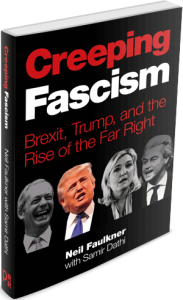 It was one of those moments when the world changed. Like the fall of the Berlin Wall in 1989, the bombing of the Twin Towers in 2001, and the financial crash of 2008, the election of Donald Trump as US president in November 2016 sent shock-waves across the globe.
It was one of those moments when the world changed. Like the fall of the Berlin Wall in 1989, the bombing of the Twin Towers in 2001, and the financial crash of 2008, the election of Donald Trump as US president in November 2016 sent shock-waves across the globe.
Commentators struggled for words. A billionaire tax-dodger, a ranting racist, a misogynist and self-confessed abuser of women, a bully who taunts the disabled and the bereaved, a serial liar, a man proud of his bigotry, his hatred, his contempt for most of humanity, this man had just been elected to the most powerful political position on the planet. Sixty-three million Americans had voted for a political psychopath.
The election of Trump is the most significant breakthrough so far in the advance of a global movement. Trump, anticipating victory on the eve of his election, bragged it would be ‘Brexit plus, plus, plus’.
He was referring to the victory of the Leave campaign in the British EU referendum. Nigel Farage, Boris Johnson, Michael Gove, and other right-wing politicians, backed by the gutter press, had secured a narrow win on the basis of vacuous ‘take back control’ rhetoric and vicious anti-immigrant racism.
Creeping Fascism: Brexit, Trump, and the Rise of the Far Right is an attempt to provide a Marxist analysis of the Far Right in the United States and Europe and to argue that it represents a modern form of ‘creeping fascism’.
Creeping Fascism: Brexit, Trump, and the Rise of the Far Right is published by Public Reading Rooms.
Price: £12
![]()
This book is timed to coincide with the Campaign for Nuclear Disarmament’s 60th anniversary, drawing on archive material and interviews with activists from across the decades, and situating CND’s current work in the context of the Trump presidency and increasing global tensions around nuclear weapons.
Founded in 1958 at the height of the Cold War, CND voiced a growing concern about the dangers of nuclear weapons. Since then CND has become a byword for protest and radicalism, shaping three generations and inspiring mass movements for peace across the globe.
This is a timely and important book, by CND general secretary Kate Hudson. It provides detailed coverage of the inside story of six decades of CND – from the mass protests at Aldermaston and Greenham Common, to its central role in post 9/11 anti-war campaigning, to today’s struggle to prevent Trident replacement and win support for the United Nations’ new global ban on nuclear weapons.
Kate Hudson is a political activist, peace campaigner and academic, author of Breaking the South Slav Dream: The Rise and Fall of Yugoslavia; European Communism Since 1989; The New European Left: a socialism for the twenty-first century?, and editor of Free Movement and Beyond: agenda setting for Brexit Britain.
]]>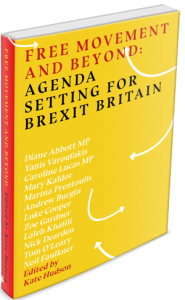
Free Movement and Beyond: Agenda Setting for Brexit Britain is an edited collection that draws together the current thinking of many of Britain’s most prominent ‘critical Remainers’ – those who argued to remain within the European Union while seeking its democratic and progressive transformation.
Seeking to contribute to the policy agenda for the Brexit process, the contributors centrally address the controversial issue of free movement of people, defending it as central to Britain’s economic success and as an advance for the working class across Europe; myths that blame migration for economic woes are debunked and the racism that such myths give rise to is condemned.
Policy proposals and principles are outlined for democracy, economics, trade policy, security policy, the environment and workers’ rights.
Editor: Kate Hudson | Contributors: Diane Abbott MP, Yanis Varoufakis / Caroline Lucas MP / Mary Kaldor / Marina Prentoulis / Andrew Burgin / Luke Cooper / Zoe Gardner / Laleh Khalili / Nick Dearden / Tom O’Leary / Neil Faulkner
]]>
What they said about Left Field
“Scrapping Trident is an indivisible part of Labour’s forward march. The heated debate in Labour’s ranks is not reflected in public opinion. Talk to your next door neighbour, your mates in the pub or club, chat to that person sitting on the bus next to you. You’ll find little appetite for nuclear weapons.
Opinion has changed. Nuclear disarmament is mainstream. The problem is one of ‘operationalising’ those sentiments, putting pressure on politicians to understand and honour them.”
So says Carol Turner, longstanding Labour party member and CND activist, author of Corbyn and Trident: Labour’s continuing controversy. Highly topical, this book looks at the challenges facing Labour’s anti-Trident leader Jeremy Corbyn as he steers his party through a difficult defence policy debate where the question of nuclear weapons has again raised its controversial head.
Turner situates Corbyn’s dilemmas in the context of Labour’s longstanding and continuing controversy over Britain’s nuclear weapons possession – from the days of the first atmospheric tests, through Polaris and Chevaline to Trident and its replacement. The consistent theme is the struggle within the party – sometimes successful – to secure an anti-nuclear position.
“Drawing on interviews with big labour movement players of the last decades, Carol Turner has produced a fascinating account of the turbulent debates within the Labour Party over this most crucial of questions – and the impact of a CND vice-president in Labour’s top spot.”
Kate Hudson, Campaign for Nuclear Disarmament
 Transform #3 | £7.50 post free
Transform #3 | £7.50 post free
![]()
See Transform founding statement and editorial board here…
Transform: Issue #3 | Contents
The world is an increasingly dangerous place: threats of military intervention and nuclear war, the rise of the far right and reactionary nationalism, increasing racism and xenophobia, accelerating climate change. And there’s the tendency from the right to withdraw behind national boundaries, to exclude the ‘other’, blaming ordinary people, people like us, from other countries, for the social and economic ills we face, instead of putting the blame squarely where it belongs: with thirty years of neo-liberal economic policy and the systematic dismantling of our welfare state and the social values that underpin it.
Transform Issue #3 addresses some of these questions: looking at the US role in the crisis with North Korea; emphasizing the need for European-wide working class cooperation; considering the extent to which Corbynism can counter the rise of the far right; the impact of neoliberal policies on our society, from housing, to disabled people, to mental health; what economic policies Labour needs to pursue to fundamentally challenge neoliberalism; and a review of Yanis Varoufakis’s take on his time in Greece’s besieged government.
Our pages are open to explore the immense political challenges that we face. Please get in touch if you would like to contribute: contact [email protected]
£7.50 Postage free (in UK)
For orders outside the UK, contact [email protected]
Editorial
Kate Hudson
North Korea: Trump’s threats should worry us more than Kim Jong-un’s
Jude Woodward
Another Europe is Necessary
Andrew Burgin
Disability, Social Oppression and Neoliberalism
Bob Williams-Findlay
The Left and the Rise of the Far Right: does Corbynism offer the solution?
Sue Sparks
Public Housing after Grenfell
Doug Thorpe
Reconsidering The Sane Society
Robert Hoskin
Facing the Current Crisis: the writing on the wall
Neil Faulkner and Phil Hearse
Review: Adults in the Room: My Battle with Europe’s Deep Establishment by Yanis Varoufakis
Roger Silverman
Transform #3 | £7.50 post free
![]()
Back issues of Transform are available here…
]]> This book is timed to coincide with the Campaign for Nuclear Disarmament’s 60th anniversary, drawing on archive material and interviews with activists from across the decades, and situating CND’s current work in the context of the Trump presidency and increasing global tensions around nuclear weapons.
This book is timed to coincide with the Campaign for Nuclear Disarmament’s 60th anniversary, drawing on archive material and interviews with activists from across the decades, and situating CND’s current work in the context of the Trump presidency and increasing global tensions around nuclear weapons.
Founded in 1958 at the height of the Cold War, CND voiced a growing concern about the dangers of nuclear weapons.
Since then CND has become a byword for protest and radicalism, shaping three generations and inspiring mass movements for peace across the globe.
This is a timely and important book by CND general secretary Kate Hudson. It details the inside story of CND over six decades – including the mass protests at Aldermaston and Greenham Common, its central role in post 9/11 anti-war campaigning, and today’s struggle to prevent Trident replacement and win support for the United Nations’ new global ban on nuclear weapons.
Kate Hudson is a political activist, peace campaigner and academic, author of Breaking the South Slav Dream: The Rise and Fall of Yugoslavia; European Communism Since 1989; The New European Left: a socialism for the twenty-first century?, and editor of Free Movement and Beyond: agenda setting for Brexit Britain.
]]> The US has China in its crosshairs. As the Middle Kingdom relentlessly catches up with the US as the world’s economic superpower, voices in the US politico-military establishment have become increasingly shrill in their demands that something is done to stop it.
The US has China in its crosshairs. As the Middle Kingdom relentlessly catches up with the US as the world’s economic superpower, voices in the US politico-military establishment have become increasingly shrill in their demands that something is done to stop it.
In 2010 Obama obliged by announcing a turn in military and foreign policy to ‘pivot to Asia’, which was universally understood to be aimed at containing China. This is one Obama policy that Trump has not sought to reverse; instead he has deepened it.
From 2010 the US military and naval presence in East and Southeast Asia was relentlessly expanded and US friends and allies were encouraged to challenge China in the region – primarily by whipping up old territorial disputes that had been laid unresolved but undisturbed since the 1945 post-war treaties.
Hence in 2012 Japan made an issue of the disputed Senkaku/Diaoyu islands in the East China Sea that led to a sharp diplomatic standoff and the excuse for Japan to sharply increase its military spending. In the same year, the Philippines provoked a conflict with China in the South China Sea, which became the excuse for an stepped up US Navy presence in the Sea. More recently India provoked a face-off with China on the Doklam plateau.
And many of the current problems with North Korea stem from the same roots: while North Korea’s nuclear tests, missile launches and anti-American rhetoric have been extremely provocative, they have been this small and isolated country’s response what it believes is a growing military threat from the US as it expands its bases in South Korea and undertakes increasingly large and aggressive war games in the Yellow Sea between China and North Korea.
As China rises and the US declines, the attempt by the US to maintain its primary influence in Asia is being played out not just in threats to impose tariffs and trade sanctions on China, but in a diplomatic and economic struggle with China that plays out in every single country of the region.
This timely book by Jude Woodward is an essential counter to arguments that the world faces a ‘China threat’. Instead it shows that the real source of rising tensions in Asia comes from a declining US determined to maintain its leading role in the region, even if the price for this is economically and socially destructive and means a military build-up that risks provoking new wars.
The US vs China: Asia’s new Cold War? draws back the veil and reveals the real dynamics at play between the US and China.
Number of Pages: 304
£22.50 post free
![]()
Transform #2 | £7.50 post free
![]()
Transform #1, published in May 2017, sold out its first print run very quickly. See Transform founding statement and editorial board here…
Transform: Issue #2 | Contents
Right-wing forces have frequently emerged stronger from the financial crisis of 2008, but left and progressive forces have also challenged for power, and unfolding political developments and new mobilisations in Britain and elsewhere demonstrate that the right is being fought and can be defeated.
This issue of Transform addresses some of these questions: looking at the UK 2017 general election outcome and what the Labour surge means; exploring the impact of Trump’s onslaught on women; closer investigation of the practice of left parties and movements in Germany and Poland; thoughts on how to drive forward a socialist agenda; and a powerful memoire of the miners’ strike and its transformative legacy.
Our pages are open to explore the immense political challenges that we face. Please get in touch if you would like to contribute: contact [email protected].
Editorial
Kate Hudson
Winter and Spring: the extraordinary 2017 Labour surge
Michael Wongsam
The Continuing War against Women in the US
Susan Pashkoff
Germany’s Die Linke in times of polarization
Mark Bergfeld and Leandros Fischer
The History and Future of the Polish Left
Czesław Kulesza and Gavin Rae
Thatcher and the Miners: remembering the 1984 strike
Jim Gibson
Where We Are and Where We Could Be: transitional demands and actions
Len Arthur
Review | Russian Revolution: Hope, Tragedy, Myths
Joseph Healy
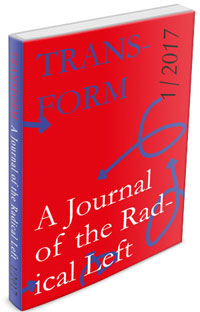 Transform: A Journal of the Radical Left
Transform: A Journal of the Radical Left
See Transform founding statement and editorial board…
The first issue of Transform has been published. Its wide-ranging contents address key issues on a global and national level, from Trump to Brexit, from left populism to world capitalist crisis.
Transform is linked to the transform! network of the European Left.
Transform Contents: Issue 1
- The World According to Trump / Jude Woodward
- Latin America and the European Left / Francisco Dominguez
- The Fashion-Celebrity Nexus: a new opiate of the people? / Interview with Tansy Hoskins
- The Permanent Debt Economy: towards a new Marxist understanding of the world capitalist crisis / Neil Faulkner
- Left Populism: the challenges from grassroots to electoral politics / Marina Prentoulis and Lasse Thomassen
- Northern Ireland and the Brexit Wrecking Ball / Joseph Healy
- Right wing putsch, escalating racism, deepening austerity: the real meaning of Brexit / Phil Hearse
]]>
